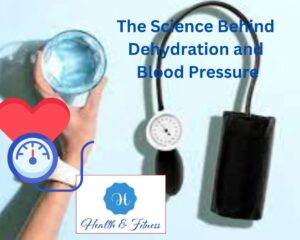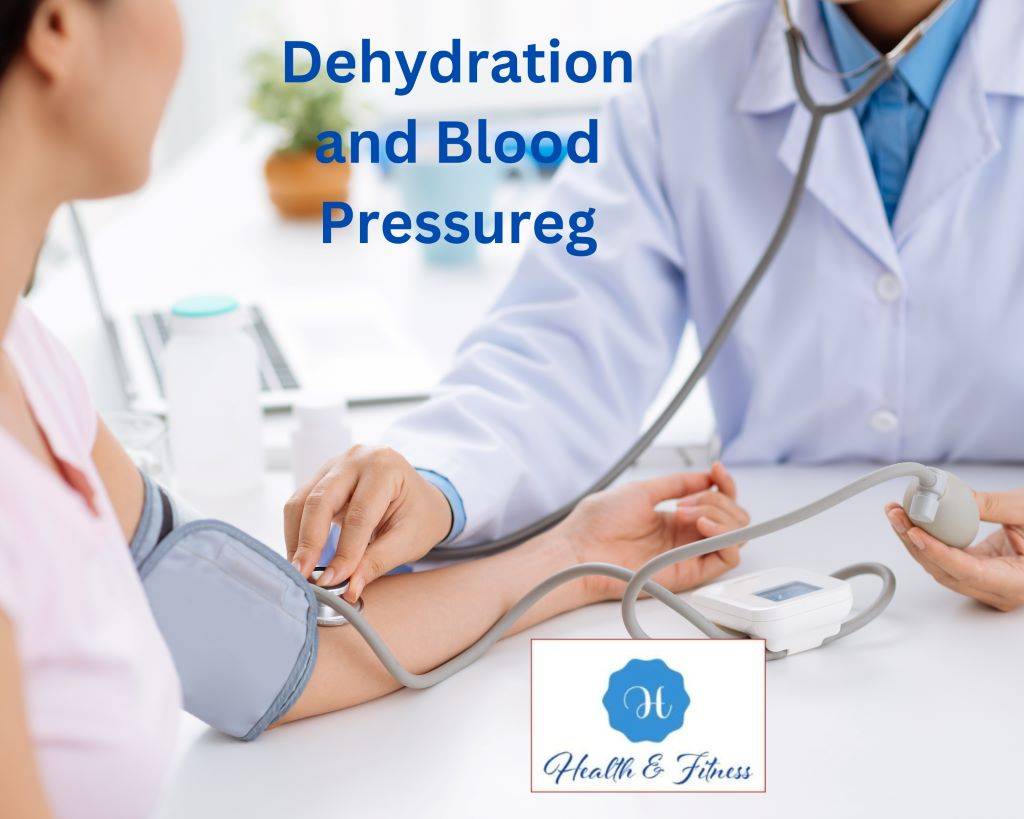Dehydration and Blood Pressure: The Silent Threat to Your Cardiovascular Health
Dehydration and blood pressure are two seemingly unrelated health concerns. However, the connection between them is more significant than you might think. In this comprehensive guide, we’ll explore the science behind dehydration and its effects on blood pressure, revealing the silent threat it poses to your cardiovascular health. We’ll also discuss the importance of hydration for different age groups and lifestyles, and provide tips for maintaining optimal hydration levels to promote better health.
The Science Behind Dehydration and Blood Pressure

Understanding the relationship between dehydration and blood pressure requires a closer look at the underlying science.
How Dehydration Affects Blood Pressure
Dehydration occurs when your body loses more fluids than it takes in, leading to an imbalance in your body’s water content. This can happen due to various reasons, such as excessive sweating, illness, or simply not drinking enough water. When dehydration occurs, it can have a direct impact on your blood pressure.
- Dehydration causes blood volume to decrease, which in turn reduces blood pressure. When there is less blood in circulation, the heart needs to work harder to deliver blood to the body’s organs and tissues. This can lead to hypotension or a brief dip in blood pressure.
- As blood volume drops, the body responds by narrowing blood arteries and speeding up the heart. This can cause a temporary spike in blood pressure, known as hypertension. Over time, if dehydration persists, it can lead to chronic high blood pressure, which is a significant risk factor for heart disease and stroke.
The Role of Electrolytes
Electrolytes, such as sodium and potassium, play a crucial role in regulating blood pressure. They help maintain the balance of fluids in and around your cells and are essential for proper nerve and muscle function.
- Dehydration can lead to an imbalance in electrolyte levels, further impacting blood pressure. When you’re dehydrated, your body may retain more sodium, causing an increase in blood pressure. On the other hand, dehydration can also lead to a decrease in potassium levels, which can also contribute to high blood pressure.
The Impact of Dehydration on the Kidneys
The kidneys play a vital role in regulating blood pressure by controlling fluid balance and releasing hormones that help regulate blood pressure.
- Dehydration can impair kidney function, leading to increased blood pressure. When you’re dehydrated, your kidneys may release a hormone called renin, which can cause your blood vessels to constrict and increase blood pressure. Additionally, impaired kidney function can lead to fluid retention, further contributing to high blood pressure.
Dehydration and Blood Pressure: The Silent Threat to Your Cardiovascular Health
Dehydration can significantly impact your blood pressure, posing a silent threat to your cardiovascular health. Here are some ways dehydration can affect your heart and blood vessels:
- Dehydration can lead to orthostatic hypotension, a sudden drop in blood pressure when standing up, causing dizziness and fainting. This can be particularly dangerous for older adults, who may be at a higher risk of falls and injuries.
- Chronic dehydration may contribute to hypertension, increasing the risk of heart disease and stroke. High blood pressure can damage your blood vessels and heart, leading to serious health complications if left untreated.
- Dehydration can exacerbate existing high blood pressure, making it more challenging to manage and control. If you already have high blood pressure, staying properly hydrated is essential for maintaining your cardiovascular health.
- Dehydration-induced low blood pressure can cause fatigue, weakness, and cognitive impairment. These symptoms can affect your daily life and overall well-being, making it crucial to address dehydration promptly.
- Severe dehydration can lead to a life-threatening condition called hypovolemic shock, characterized by a rapid drop in blood pressure and organ failure. This condition requires immediate medical attention and highlights the importance of staying properly hydrated.
The Importance of Hydration for Different Age Groups and Lifestyles
Proper hydration is essential for everyone, but certain age groups and lifestyles may have unique hydration needs.
Children and Adolescents
- Younger individuals have a higher risk of dehydration due to their smaller body mass and higher metabolic rates. Encourage regular water intake and monitor for signs of dehydration, such as dark yellow urine, dry mouth, and lethargy.
Adults and Seniors
- Older adults may experience a decreased sense of thirst, increasing the risk of dehydration. It’s essential to drink water regularly, even when not feeling thirsty, and to be aware of the signs of dehydration.
Athletes and Active Individuals
- Physical activity increases the risk of dehydration due to increased sweating and fluid loss. Athletes should prioritize hydration before, during, and after exercise to maintain optimal performance and cardiovascular health.
Tips for Maintaining Optimal Hydration Levels
To prevent the negative effects of dehydration on blood pressure, it’s essential to maintain proper hydration levels. Here are some tips to help you stay hydrated:
- Drink at least eight 8-ounce glasses of water per day. This is a general guideline, but your needs may vary depending on age, sex, and activity level.
- Carry a water bottle with you throughout the day to encourage regular water intake.
- Eat water-rich foods, such as fruits and vegetables, to help maintain proper hydration levels.
- Limit your intake of caffeine and alcohol, as they can contribute to dehydration.
- Monitor your urine colour to gauge your hydration levels. Aim for a pale yellow colour, which indicates proper hydration.
Conclusion
Dehydration and blood pressure are closely linked, with dehydration posing a silent threat to your cardiovascular health. By understanding the connection and maintaining optimal hydration levels, you can promote better health and reduce the risk of blood pressure-related complications. Stay vigilant about your hydration habits and prioritize your cardiovascular well-being.
Frequently Asked Questions about Dehydration and Blood Pressure
Can dehydration cause high blood pressure?
Yes, Dehydration is a known contributor to hypertension. Dehydration causes the heart to work harder to pump the same amount of blood, which can increase blood pressure. Maintaining healthy blood pressure requires adequate hydration, which can be achieved by drinking plenty of water.
How does dehydration affect blood pressure in athletes?
Dehydration can have a significant impact on blood pressure in athletes. When an athlete becomes dehydrated, their blood volume decreases, which can lead to a decrease in blood pressure. This lower blood pressure can make the heart work harder, increasing the risk of cardiovascular disease. In addition, dehydration can also cause a decrease in sodium levels in the body, which can further lower blood pressure. Athletes need to stay properly hydrated before, during, and after exercise to maintain proper blood pressure and overall health.
What are the long-term effects of dehydration on blood pressure?
Dehydration can cause a temporary increase in blood pressure due to a decrease in blood volume. However, the long-term effects of dehydration on blood pressure are not well-established. Chronic dehydration can lead to other health problems such as kidney damage, and if left untreated, these problems can affect blood pressure. Additionally, dehydration can increase the risk of developing blood clots and thickened blood, which can also impact blood pressure levels. It is important to stay hydrated and maintain a healthy lifestyle to help manage blood pressure.
Can drinking water help lower blood pressure?
Yes, drinking water can help lower blood pressure, especially if you are dehydrated. When your body is dehydrated, it can cause your blood vessels to narrow, which can increase blood pressure. Drinking water helps to hydrate your body, thereby relaxing your blood vessels and reducing blood pressure. It’s recommended that you drink at least 8 glasses of water a day to help maintain healthy blood pressure. However, if you are already drinking enough water and still have high blood pressure, you should speak to your doctor for medical advice.
How can I stay properly hydrated throughout the day?
1- Drink water regularly: Make sure to drink water at regular intervals throughout the day, such as after waking up, before and after meals, and before and after exercises.
2- Eat fruits and vegetables with high water content: Fruits and vegetables such as watermelon, cucumber, tomatoes, strawberries, and lettuce have high water content and can help you stay hydrated.
3. Avoid or limit caffeine and alcohol: Caffeine and alcohol act as diuretics and can cause dehydration, so it’s important to limit your intake of them.
4. Carry a water bottle with you: Keep a water bottle with you at all times and sip from it throughout the day, this will help remind you to drink water regularly.
5. Check your urine: Pay attention to the colour of your urine. If it’s dark yellow, it’s a sign that you’re not drinking enough water and need to hydrate more. You’re likely well-hydrated if your urine is light yellow or clear.
Reference
Centers for Disease Control and Prevention. (2021). High Blood Pressure. Retrieved from https://www.cdc.gov/bloodpressure/index.htm
American Heart Association. (2021). About High Blood Pressure. Retrieved from https://www.heart.org/en/health-topics/high-blood-pressure/understanding-blood-pressure-readings
You may be interested in
Best Information About High Blood Pressure

Adel Galal is a health and wellness writer with over 30 years of experience studying and writing about health, fitness, nutrition, and healthy living. He is the founder of NextFitLife.com, where he shares practical, evidence-based guidance to support long-term health at any age. Adel’s mission is simple:
to help people make smarter health choices that fit real life, at any age.



